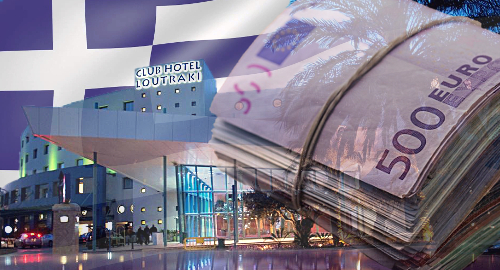 Greece’s financially struggling Club Hotel Casino Loutraki sees some light at the end of the tunnel after winning a major back-tax court fight with the Greek government.
Greece’s financially struggling Club Hotel Casino Loutraki sees some light at the end of the tunnel after winning a major back-tax court fight with the Greek government.
Last week, the Tripoli Administrative Court of Appeal ruled that the Greek government was wrong to hike the Loutraki casino’s tax rate from 20% to 33% in 1996. The ruling, details of which were reported by Greek media this week, mean the casino’s new tax rate will be 22% (counting a 2% municipal contribution).
The court ruled that the tax rate would apply retroactively, meaning the casino is now eligible for a government refund of €40m to cover the years 2008-11. A separate claim covering the years 2012-15 could add a further €18m to the government’s tab, and both sums could be subject to interest payments.
All told, the Loutraki casino could be in for a €70m payday, but the government is actually getting off easy. The court deemed the tax years prior to 2008 to be ineligible, otherwise the government would be facing a €450m tab.
The Loutraki casino has struggled in recent years, and was temporarily closed in 2015 due to its inability to pay its taxes. Last November, a court ordered the casino’s creditors take a 40% haircut on their receivables, while the casino was given a 15-year window in which to repay the rest.
The recent court ruling could permit the Loutraki casino to hold on to its original gaming license indefinitely, which could increase interest from potential buyers who have been kicking the property’s tires in recent years. It’s uncertain what effect this licensing holdover could have on the government’s plan to revamp its casino licensing structure.
IMPACT ON GREEK LEGISLATION?
Last week, the Greek government approved new casino legislation, which calls for three new casinos on the islands of Crete, Mykonos and Santorini. The government is still considering whether to go ahead with previous plans to develop a major casino resort on the site of the former Hellinikon airport near Athens.
The legislation revamps the casino tax structure, imposing a 20% rate on gross gaming revenue up to €100m, 15% on the next €100m, 12% on revenue between €201m and €500m, and 8% on revenue over €500m. Casinos will also be allowed to offer select players gambling credit of up to €50k, which the government hopes will help casinos attract international high-rollers.
The country’s nine existing casinos have been granted permission to relocate, welcome news to the Regency Casino Mont Parnes, which has long lobbied to move closer to Athens from its current location 40 miles away.
The legislation also abolished the much-despised casino entry levies, although the existing casinos have to pay a compensation fee for the privilege of stopping the collections. The old casinos also face a steeper corporate tax rate than the new venues.
Greece’s casino market has been in freefall in recent years, along with the nation’s overall economy. Greek casinos’ annual gaming revenue peaked at €744m in 2008 but managed only €263m in 2016, a 65% decline.
Six of Greece’s nine existing casinos are said to be on shaky financial footing, and the new legislation permits the government to withdraw the licenses of any casino which goes more than 30 days without paying its bills.
Critics have suggested the new legislation is biased toward the new licensees, while cynics have suggested the government’s intention is to use the new enforcement measures to clear out the deadwood and ensure its shiny new casinos have even less competition.